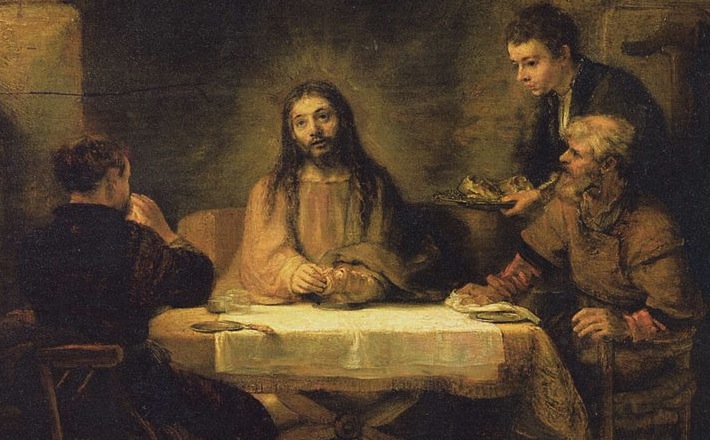Commentary on Acts 2:14a, 36-41
This week’s passage includes the brief introduction to Peter’s Pentecost sermon (2:14a), the concluding statement of the sermon (2:36), and the subsequent response of his audience (2:37-41).
It both provides us with the story of the early church’s first moment of growth and models for us the way to respond to the proclamation of the gospel of Christ’s resurrection.
The opening of our passage (2:14a) is simply the introduction to the sermon Peter delivered following the bestowal of the Holy Spirit at Pentecost; a portion of this sermon formed last week’s Acts text. The sermon has two main points to it: first, that the Pentecost experience was the fulfillment of the prophetic promise of the end-times gift of God’s Spirit; and second, that Jesus’ resurrection was likewise a fulfillment of prophecy and hence a proof of Jesus’ exalted and messianic status, and thus further that Jesus’ resurrection was a necessary precursor to the giving of the Spirit.
The single, concluding verse from the sermon included in our passage restates the key point about Jesus: God has made him “both Lord and Messiah” (verse 36). Both titles refer back to specific arguments made earlier in the sermon. The title “Lord” reflects the sermon’s use of Psalm 110:1 (verses 34-35) as a prophecy about Jesus, referring to Christ’s exalted status resulting from his resurrection and ascension.
The title “Messiah” (or “Christ,” as in most translations) picks up on Jesus’ status as David’s heir (verses 29-31), David being the prototype of the Messiah in most Jewish thinking of the day. That Jesus is identified with both titles is contrasted in verse 36 with his treatment by Peter’s own audience members: Jesus is the one “whom you crucified.”
It is this contrast between Jesus’ exalted status and the audience’s treatment of him that forms the basis for the subsequent response of the audience. Clearly convicted of the identity of Jesus, the audience is “cut to the heart,” a depiction of their deep anguish (verse 37). Unsure of the proper response, they ask Peter what to do. Peter gives them two actions to perform and two ensuing results (verse 38):
First, they are to “repent” (Gk metanoesate). This word will no doubt sound rather old-fashioned to many, if not most, Christians today, since it is not a part of our day-to-day vocabulary. It is perhaps used as often as not today in parody of old-time revival preaching. Here, however, the concern is not for any particular sins the audience may have committed — there is no suggestion that they are especially immoral or otherwise bad sinners — but rather for a basic reorientation of their lives with respect to Jesus.
Formerly, they were involved in putting Jesus to death; now they are to base their lives on his identity as Messiah and Lord. This repentance, this reorientation is more than just saying they are sorry. In fact, as verses 42-47 (the passage for next week) will make clear, it entails a complete change of lifestyle, a life in accordance with Christ’s true status and the activity of the Spirit.
Second, they are to be baptized “in the name of Jesus Christ.” Baptism is usually narrated in Acts as the normal response to acceptance of the gospel message, constituting the believers’ transition to the Christian community. Here it is the natural concomitant sign of repentance, the concrete act marking the reorientation of their lives to Christ and the Spirit.
The first result of their actions is the forgiveness of their sins. This is a common topic in Luke and Acts (see especially the last words of Jesus in Luke 24:46-49, a passage with quite a few connections to Acts 2). The message began with John the Baptist’s preaching (Luke 3:3) and thus carries with it a certain eschatological (end-times) urgency — while forgiveness of sins relates to one’s present status before God, it is especially important as preparation for the coming Last Judgment (repentance is also associated with the importance of the coming Last Judgment in Acts; see especially 17:30-31).
The second result is the gift of the Holy Spirit. This, of course, is the whole point of Pentecost, and the Joel prophecy used in Peter’s speech had declared that God’s spirit was to be poured out on “all flesh,” including old and young, female and male, and servants alongside the more usually esteemed (2:17-18).
Here, Peter makes clear that the Spirit is indeed to be given to all — it was not a special gift only for the original community or its leaders. Verse 39 continues this thought, where he adds that “the promise” (a reference to the Spirit; see verse 33) is to be extended to “all who are far away,” a hint of the spread of the Christian message and community to be narrated in the rest of Acts — the Spirit will be given to all those who become part of the church.
Verse 40 follows up these words of Peter with a summary that Peter said many other things, summarizing his message as, “Save yourselves from this corrupt generation.” The identity of what one is saved from is striking here. As verses 42-47 will make clear, the repentance called for entails a clear distinction of the church from the rest of the world — again a reorientation of life in light of the recognition of Christ’s status and the work of the Spirit. The concluding language of verse 41 emphasizes this further: Three thousand souls were “added” to the community. Salvation and Christian community go hand in hand.
Some of the chief points for preaching this passage are hopefully clear: Surely today we still need a type of repentance that involves reorienting our lives towards Christ. Surely today we need the gift of the Spirit as much as the first Christians did. And surely today we need to understand that salvation entails being added to the Christian community and living lives that distinguish us from the corruption of the world.


May 4, 2014